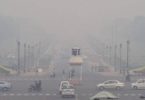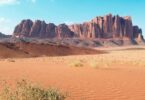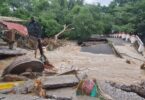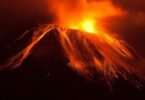Earthquake and Tsunami Quiz for Kids:
Intensity of an earthquake is measured by
(a) Modified Mercalli scale
(b) Richter scale
(c) Seismograph
What is the epicenter of an Earthquake?
(a) The point at which the earthquake originated
(b) The point which is prone to volcanoes
(c) The point from which the intensity of seismic waves declines
(d) The point on the earth’s surface vertically above the seismic focus
Tsunami can occur only during
(a) Evening
(b) Afternoon
(c) Any time of the day or night
(d) Morning
Which of the following is correct about earthquakes ?
(a) The intensity of the earthquake is measured on the Richter Scale.
(b) Modified Mercalli is used to measure the magnitude of an earthquake
(c) The modified Mercalli scale ranges from I to XII
(d) The Richter scale is a close ending scale
Related: Geography quiz questions and answers
The word tsunami is derived from
(a) French word
(b) Latin word
(c) Japanese word
(d) Greek word
The Richter scale expresses earthquakes
(a) Magnitude
(b) Location
(c) Duration
(d) Depth
The main cause of the tsunami is.
(a) Volcanoes
(b) Cyclones
(c) Earthquake on sea floor
(d) Moon’s attraction
The point of the earth’s surface directly above the point where an earthquake occurs is called the:
(a) Focus
(b) Epicenter
(c) Fracture
(d) Fault
Related: Deserts multiple choice quiz questions
Earthquake is caused by
(a) disturbance of earth’s surface
(b) adjustment of layers of earth’s crust
(c) breakage of rock system
(d) uplift-ment of rocks
The instrument which records earthquake waves is called
(a) Climograph
(b) Seismograph
(c) Hythergraph
An earthquake is also known as
(a) Teacher
(b) Tremor
(c) Temper
Which of the following is not correct about P waves in the context of earthquakes?
(a) They are compressional
(b) They vibrate to and fro along the direction of propagation
(c) They cannot travel through liquids
(d) They are like sound waves
Which is known as a seismic wave ?
(a) Tsunami
(b) Hurricane
(c) El Nino
(d) Typhoon
Related: Ancient and Modern world names of counties quiz
The term ‘epicenter’ is associated with
(a) Earthquakes
(b) Tornadoes
(c) Cyclones
(d) Earth’s interior
Which wave of the earthquake produces a rolling effect along the surface?
(a) P wave
(b) S wave
(c) L wave
What led to the maximum number of fatalities during the 2004 Indonesian Earthquake?
(a) Death on account of openings on the surface
(b) Fires generated due to earthquakes
(c) Epidemic diseases
(d) Tsunami
Natural earthquakes are caused by __
(a) Earth’s crust
(b) deep seas
(c) peak mountains
(d) forests
Related: Global Warming quiz questions and answers
Tsunamis are caused by—
(a) Mixing of cold and warm currents
(b) Earthquakes
(c) Changes in sea level
(d) Volcanic eruption
Earthquakes are generally associated with:
(a) Joints
(b) Faults
(c) Folds
(d) Schistosity
The slipping down of large masses of earth and rock from hillsides, river banks or cliffs is called:
(a) soil erosion
(b) siltation
(c) leaching
(d) landslide






